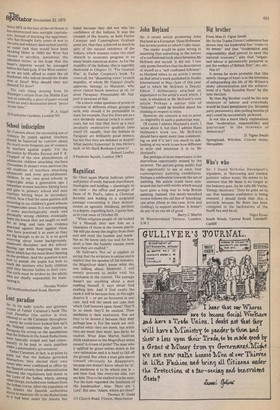Magnificat
Sir: Once again Martin Sullivan, priest and pastor of souls, learned churchman, theologian and holding — alarmingly in my view — the office and prestige of Dean of St Paul's, takes a Christian doctrine and leading to a scriptural passage concerning it then demonstrates an agnostic blindness, perilous to a degree, regarding both. 1 quote him, as in your issue of October 25.
"When religious people of old looked for a Messiah they saw him as a champion of those in the lowest places. 'He will put down the mighty from their seat and exalt the humble and meek.' Not so. He knew only too well for how short a time the humble remain meek once they are exalted."
Mr Sullivan's 'Not so' is explicit as saying that the stripture is untrue and is implicit that the speaker of, for instance, the Magnificat didn't know what she was talking about. However, I will merely proceed to make void his conclusion in the context. The passage doesn't say anything about a man exalting himself. It says about God exalting him. And if God exalts the meek it will be because they, in His sight deserve it — or are so favoured in any case. And will the meek not take that which God bestows upon them? They'll be so meek they'll be exalted. Their meekness is their exaltation. Nor are they to be denied it because they may perhaps lose it. For the meek are only . exalted while they are meek, but while they are meek they must, ipso facto, be exalted. What does Martin Sullivan think exaltation in the Magnificat sense means? A crown of pride? The man who is uplifted by grace settles down in his own estimation and it is hard to fall off the ground. But when a man gets above himself obviously he disappears, because one doesn't know where he 'is'. But meekness is to be where one is — and then God, like everyone else, can see him. Thus to be exalted is to be seen. 'For He bath regarded the lowliness of His handmaiden'. Also: 'Here am I, Lord'. But also: 'Adam, where art thou?' Thomas W. Gadd 171 Church Road, Flixton, Manchester
































 Previous page
Previous page